 Petzlover
Petzlover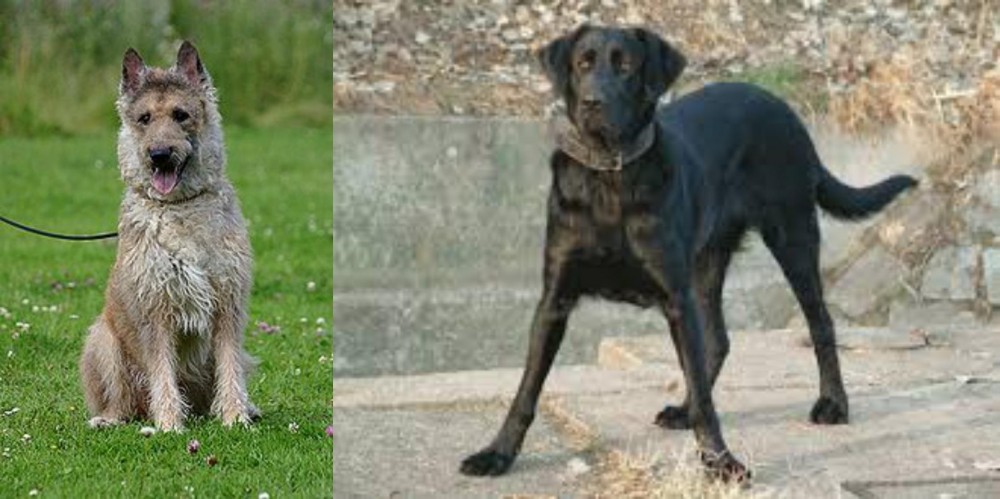 Belgian Shepherd Dog (Laekenois) is originated from Belgium but Cao de Castro Laboreiro is originated from Portugal. Belgian Shepherd Dog (Laekenois) may grow 6 cm / 3 inches higher than Cao de Castro Laboreiro. Belgian Shepherd Dog (Laekenois) may weigh 40 kg / 88 pounds lesser than Cao de Castro Laboreiro. Both Belgian Shepherd Dog (Laekenois) and Cao de Castro Laboreiro has almost same life span. Both Belgian Shepherd Dog (Laekenois) and Cao de Castro Laboreiro has almost same litter size. Both Belgian Shepherd Dog (Laekenois) and Cao de Castro Laboreiro requires Low Maintenance.
Belgian Shepherd Dog (Laekenois) is originated from Belgium but Cao de Castro Laboreiro is originated from Portugal. Belgian Shepherd Dog (Laekenois) may grow 6 cm / 3 inches higher than Cao de Castro Laboreiro. Belgian Shepherd Dog (Laekenois) may weigh 40 kg / 88 pounds lesser than Cao de Castro Laboreiro. Both Belgian Shepherd Dog (Laekenois) and Cao de Castro Laboreiro has almost same life span. Both Belgian Shepherd Dog (Laekenois) and Cao de Castro Laboreiro has almost same litter size. Both Belgian Shepherd Dog (Laekenois) and Cao de Castro Laboreiro requires Low Maintenance.
 The Laekenois, from a variety of 4 Belgian Shepherds, and one of the rarest, is a working- or herding breed of dog which originated in Belgium. It is believed to have been around since the Middle Ages. The intelligent dog was also used for sending messages during the 1st World War. In most countries, all 4 of the dogs are considered the same breed with different varieties in coat types, but there are some instances where they are recognized as separate breeds.
The Laekenois, from a variety of 4 Belgian Shepherds, and one of the rarest, is a working- or herding breed of dog which originated in Belgium. It is believed to have been around since the Middle Ages. The intelligent dog was also used for sending messages during the 1st World War. In most countries, all 4 of the dogs are considered the same breed with different varieties in coat types, but there are some instances where they are recognized as separate breeds.
An interesting aspect of these dogs is that until the advent of dog shows in the 1900s, the 4 varieties were intermixed, and today purebred Laekenois can sometimes give birth to smooth-coated puppies which can be registered as Malinois.
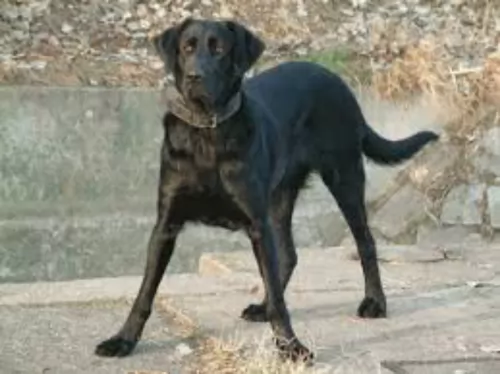 Cão de Castro Laboreiro originates from Portugal. Also known as the Portuguese Cattle Dog he was used long ago to guard livestock. Today, the modern Cao de Castro Laboreiro is descended from the molosser type dog.
Cão de Castro Laboreiro originates from Portugal. Also known as the Portuguese Cattle Dog he was used long ago to guard livestock. Today, the modern Cao de Castro Laboreiro is descended from the molosser type dog.
There are hints to the dog's origins from the 19th century, but changes in agricultural methods meant a disappearance of the dog as a livestock protector. Today the dog is mostly kept as a pet and was first seen at a dog show in 1914.
The Cão de Castro Laboreiro is recognized by the Fédération Cynologique Internationale as well as being recognized by the United Kennel Club in the United States.It is a rare dog and not many exist today but in Portugal, the USA and United Kingdom you will find a few breeders.
 The Laekenois is a highly talented dog, highly energetic and extremely intelligent. He will make a superb family pet with owners who are firm and fair with him. The dog is bright, obedient, protective and somewhat territorial. He’ll guard what he believes is his as he is instinctively protective.
The Laekenois is a highly talented dog, highly energetic and extremely intelligent. He will make a superb family pet with owners who are firm and fair with him. The dog is bright, obedient, protective and somewhat territorial. He’ll guard what he believes is his as he is instinctively protective.
He will get on well with children in the home, and he can also be socialized to get on well with other pets in the home. Of course, the way an owner treats the dog, and any other dog for that matter, brings out different temperaments in a dog. To get the best from him he should be trained and socialized from an early age. He will need plenty of exercise if you don’t want him becoming destructive from sheer boredom.
The body is well proportioned, muscular and sturdy. He has an alert, intelligent face with erect ears, bright brown eyes and the nose black. The hair is dense on the long tail, but with no feathering like with the other breeds. The most common color is fawn with a reddish undertone. The chest is deep and the legs strong and straight. The Laekenois's medium length rough, wire coat can include colors from fawn to brownish and black in between.
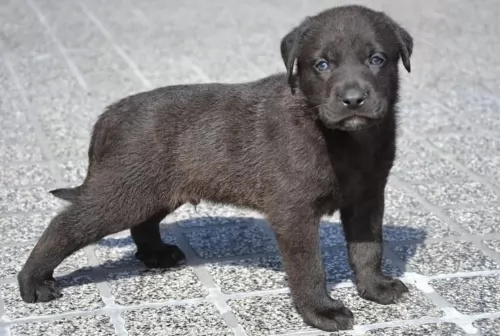 The Cão de Castro Laboreiro is a large dog, with height being in the region of 55 to 60cm and weight being in the region of 45 - 70kg. People describe the dog as wolf-like with a coat that is fairly short, thick and course. The coat is brindle with a base color of shades of grey, chestnut and black.
The Cão de Castro Laboreiro is a large dog, with height being in the region of 55 to 60cm and weight being in the region of 45 - 70kg. People describe the dog as wolf-like with a coat that is fairly short, thick and course. The coat is brindle with a base color of shades of grey, chestnut and black.
This large mastiff-type dog always has a black nose, his tail is long and carried high, but never curling over the back. He has a broad head and is much like the Labrador in looks, being free of wrinkles on the face.The ears of the Cao de Castro Laboreiro are medium-in-size and floppy while the eyes are dark brown.
The Cao de Castro Laboreiro makes an excellent pet as he forms strong bonds with his human family. He is territorial and makes an exceptional guard dog. He doesn’t particularly like strangers and is aloof around them.
This is an intelligent dog breed, he is strong-willed and stubborn, but when he is around the children in the family he is gentle and loving. When he has been trained and socialized, which is always highly recommended with every dog, he gets along with other pets in the home too.
 The Belgian Laekenois is an energetic herding breed dog, and even though he will do well in an apartment if he is sufficiently exercised, big gardens and farms would be first choice for him. Wherever you offer him a home, make sure to exercise him regularly and give him plenty of attention, as he loves his human family.
The Belgian Laekenois is an energetic herding breed dog, and even though he will do well in an apartment if he is sufficiently exercised, big gardens and farms would be first choice for him. Wherever you offer him a home, make sure to exercise him regularly and give him plenty of attention, as he loves his human family.
He’ll make an exceptional watchdog and because he is so intelligent, he learns easily, responding readily to his owner’s instruction. He’ll protect his human family with his life. Social, lively, attractive and bright, anybody who has owned a Laekenois will vouch for his loyalty and devotion, making him a splendid pet.
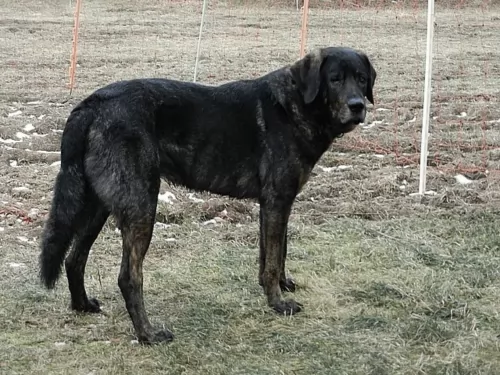 Environment and upbringing have plenty to do with how a dog turns out. People who just buy a dog for guardian purposes and nothing else can’t expect companionship in return.
Environment and upbringing have plenty to do with how a dog turns out. People who just buy a dog for guardian purposes and nothing else can’t expect companionship in return.
The Cão de Castro Laboreiro has always been a fearless guardian of livestock with his strong protective characteristics. He is intelligent and recognizes that a child in the family needs his protection.
This is a large dog who is strong, brave and intelligent but with his human family he is gentle, loving and loyal. Nonetheless he still requires a firm owner, and if you’re fair and firm with him you get the best with him. With this dog you can form a close friendship and bond.
 The lifespan of the Belgian Laekenois is between 10 and 14 years of age, and he is a pretty robust breed, not prone to getting sick easily. However, as with most other dog breeds, he is predisposed to some concerning health conditions.
The lifespan of the Belgian Laekenois is between 10 and 14 years of age, and he is a pretty robust breed, not prone to getting sick easily. However, as with most other dog breeds, he is predisposed to some concerning health conditions.
A frightening health issue in Belgian Shepherds is inherited epilepsy. It occurs in all four varieties. Your dog will have uncontrollable shaking that can last a few minutes. There are many causes of seizures but it is mostly an inherited disorder.
The most common eye disease is cataracts.
This is an inherited disease that causes the joints to develop improperly. He may even have difficulty getting up from lying down.
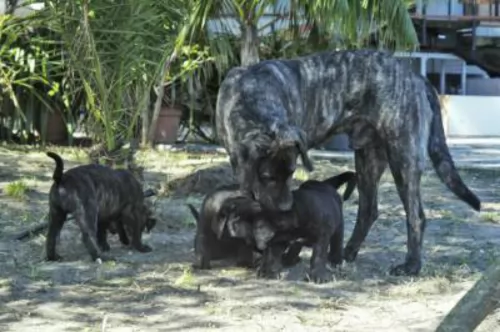 The Cão de Castro Laboreiro is generally a healthy breed, but even so, it is good to be aware of typical canine diseases that your pet may develop.
The Cão de Castro Laboreiro is generally a healthy breed, but even so, it is good to be aware of typical canine diseases that your pet may develop.
There are many eye problems that dogs have to contend with and if you see any kind of ulceration in your dogs eye, get veterinary advice.
A dog should always have access to a shady spot. Never ever leave your dog in a hot car. Heat builds up quickly and death can result soon as the body temperature rises.
Roundworm and tapeworm can infest dogs and you’ll need to speak to your vet about a worming program. Lice, mites and ticks are all parasites which attach themselves to the skin.
 The long, double coat of your Laekenois will need to be trimmed about twice a year otherwise he could look dirty and unkempt. Certainly with the coat he has, you will need to brush him at least twice a week to get rid of all those loose hairs.
The long, double coat of your Laekenois will need to be trimmed about twice a year otherwise he could look dirty and unkempt. Certainly with the coat he has, you will need to brush him at least twice a week to get rid of all those loose hairs.
He is a well muscled, athletic, energetic dog and his food, whether home-made or commercially manufactured, needs to be a high-quality food high in protein and packed full of minerals and vitamins. If you’re not sure about food type, speak to your vet, because as a dog expert, they will advise you on food appropriate to this dog breed and his energy needs. Whether you own a male or female Laekenois, feeding should be such that weight for an adult is maintained around 25–30kg.
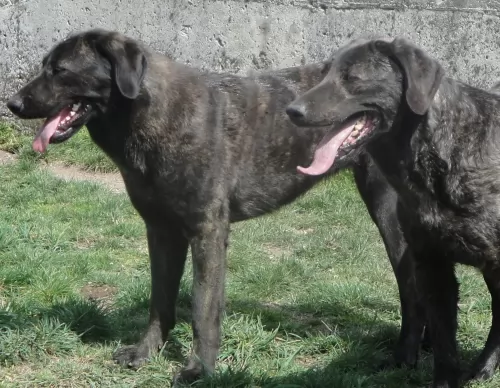 The Cao de Castro Laboreiro has a short coat which requires minimal grooming. Brushing him twice a week to rid him of loose hairs will suffice.
The Cao de Castro Laboreiro has a short coat which requires minimal grooming. Brushing him twice a week to rid him of loose hairs will suffice.
Nail clipping as well as ear- and teeth cleaning are other routine maintenance procedures for your pet.
The food you give your pet must be well-balanced and have protein and carbohydrates. If you want his skin and hair to remain healthy, vitamins, fatty acids and minerals will also be needed.
Boneless chicken and fish, brown rice and vegetables can be a good choice as well as some of the top quality commercially manufactured foods. An active dog will always need a higher protein content and therefore including raw meat into the diet is imperative – not every day as it can be very expensive, but every other day.
Remember that bones can be dangerous as they can splinter and cause your pet internal damage. Fresh, cool water must be available at all times.